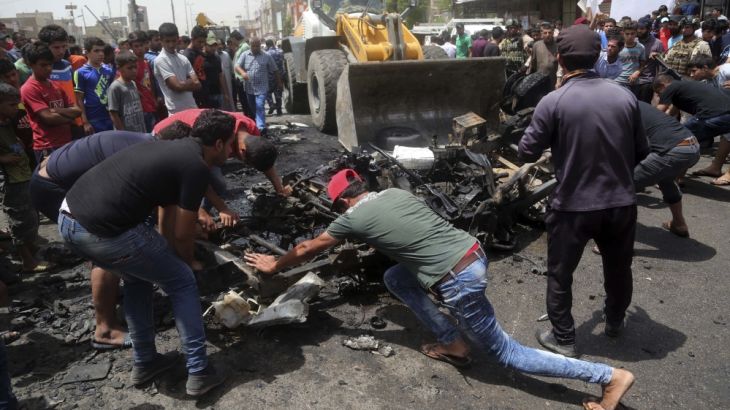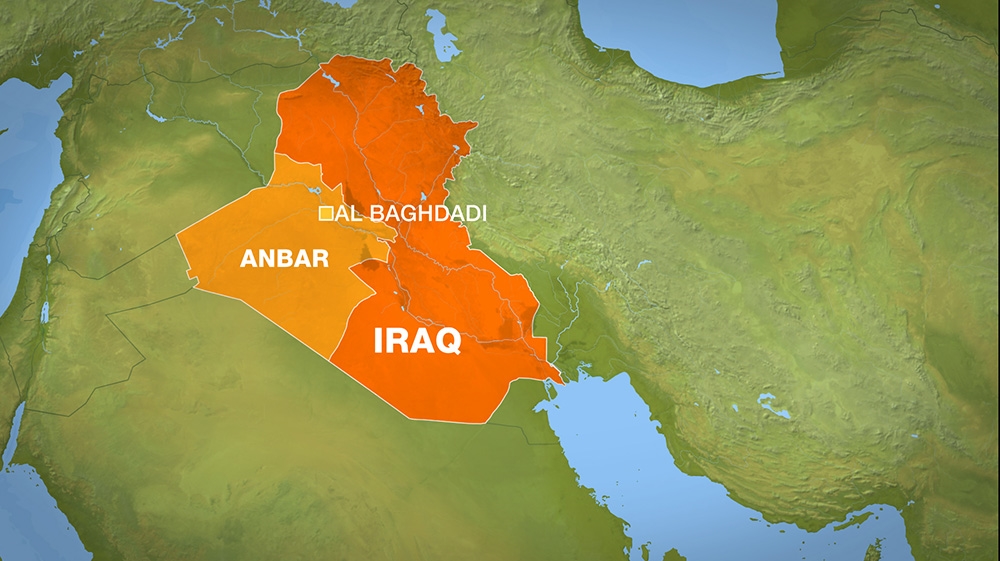ISIL claims responsibility for deadly Iraq bombings
Attacks in mainly Shia neighbourhoods mark the year’s bloodiest day for Baghdad, with death toll crossing the 90 mark.

Four separate car bombings in the Iraqi capital Baghdad have claimed at least 90 lives, police sources tell Al Jazeera.
Wednesday’s deadliest blast, from a 4WD vehicle packed with explosives, occurred near a beauty salon in a market at rush hour in Baghdad’s Sadr City neighbourhood, killing at least 63 people and wounding more than 100 others.
The Islamic State of Iraq and the Levant group (ISIL, also known as ISIS) claimed responsibility for all of the apparently sectarian attacks on Wednesday – the year’s bloodiest day in Baghdad – in a statement on social media.
ISIL said the assault in Sadr City was carried out by a suicide bomber, a claim Iraqi officials denied.
READ MORE: Dozens of ISIL mass graves found in Iraq, says UN envoy
The three other car bombings later in the day rocked three separate areas of Baghdad, killing at least 27 people.
They occurred at police checkpoints in the predominantly Shia districts Kadhimiyah and Hurriyah and in Jamiyah, police sources told Al Jazeera.
Tolls for all attacks are expected to rise.
Elsewhere in Iraq, on the outskirts of Al-Baghdadi in Anbar province, at least 15 Iraqi soldiers were killed and more than 40 wounded in another ISIL suicide attack.
The Sunni fighters blew up several cars as Iraqi government forces drew closer to ISIL-held territories.

The Iraqi army recently announced a military operation to recapture the town, which fell to ISIL in 2014.
In the past two weeks, ISIL has claimed responsibility for two attacks targeting the Shia community in and around Baghdad.
First, a car bomb, targeting an open-air market frequented by Shia Iraqis in Nahrawan, near Baghdad, killed at least 23 people and injured 38 others.
Two days later, a car bombing targeting Shia pilgrims commemorating the death anniversary of an 8th-century imam, killed at least 18 people.
In February, ISIL also claimed a twin suicide bombing in Sadr City that killed 70 people.
Fluctuating toll
According to the UN, at least 741 Iraqis were killed in April in ongoing violence, a sharp decline from the previous month.
In its monthly report issued on May 1, the UN mission to Iraq put the number of civilians killed at 410, while the rest were members of the security forces.
A total of 1,374 Iraqis were wounded that month, it said.
In March, at least 1,119 people were killed and 1,561 wounded.
OPINION: Sadr’s challenge to Iraq’s sectarian politics
Baghdad remains the worst-hit area in terms of documented deaths, with 232 civilians killed and 642 wounded in April.
Speaking to Al Jazeera from London, Ghassan al-Attiyah, of the Iraqi Institute for Democracy and Development, said the central problem lies in the lack of unity among the Iraqi people, as well as the lack of confidence citizens have in their government.
The fight against ISIL has exacerbated the sectarian conflict in Iraq, mostly between the Shia majority and the Sunni minority, which has seen flare ups since the US-led invasion in 2003.
The sectarian tensions threaten to undermine efforts to dislodge ISIL from vast areas in the north and west of Iraq, including swathes of Anbar, that the fighters seized in 2014.
|
|